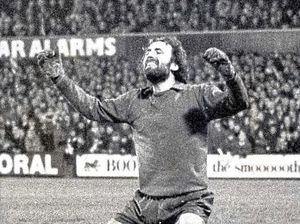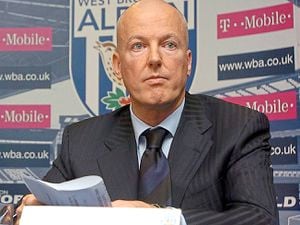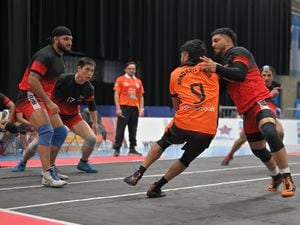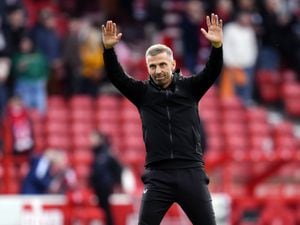Johnny Phillips: Wimbledon Cup heroics a triumph for the little Guy
When the FA Cup and Wimbledon are mentioned, it is the 1988 final that immediately springs to mind.
It has gone down in history as a David slaying Goliath moment.
“The Crazy Gang have beaten the Culture Club” was the famous line uttered at full-time by BBC commentator John Motson at Wembley, as the Dons prevented the Reds from completing a league and cup double.
In truth, it was not even the biggest Cup shock in Wimbledon’s own history. The south-west London club finished seventh in the league that season, having also beaten Liverpool on their own patch at Anfield a year earlier.
Bobby Gould’s Cup winners achieved the national acclaim they deserved but there is a team that preceded them that, outside the borough of Merton, has enjoyed less of a spotlight. The 1974/75 Wimbledon team is arguably responsible for the greatest FA Cup achievements in the competition’s history.
Under the guidance of new manager Allen Batsford, the Southern League amateurs entered the competition at the first qualifying round stage, going on to beat Bracknell Town, Maidenhead United, Wokingham Town and Guildford & Dorking United just to reach the first round of the competition.
In goal for the club was a clerk who worked down at the West India Docks, now the site of Canary Wharf, called Dickie Guy.
“I absolutely loved it, the guys in there were all football people,” he says. “I was working with Harry Redknapp’s dad, ‘Old Harry’, who was a character on his own. All he would do was tell me about young Harry. It was a good time with good friends.”
Guy is now the president of Wimbledon. Joining him for our interview, to be screened today on Soccer Saturday, is director Ivor Heller who counts Guy as one of his childhood heroes.
“When we beat Bath City [in the first round] it was the start of something special. There was a massive crowd at Plough Lane, it was an incredible atmosphere, and we beat them in the last minute. Then we beat Kettering Town who were big rivals of ours, and then we drew Burnley in the third round.”
The part-timers travelled up to Turf Moor and beat the side sitting third in the old First Division, one-nil. The victory set up a fourth round tie at Elland Road against champions Leeds, who would go on to reach the European Cup final that season.
“We pulled up outside the ground and I don’t think I’ve seen more people outside a stadium, let alone inside one,” Guy continues.
“We walked out onto the park and I was pretending I was reading the programme, but really I was shaking in my boots. The fans were banging on the hoardings around the pitch shouting, ‘Leeds, Leeds, Leeds’. I was thinking, ‘Oh my God, what have we got into here?’”
After a quiet first half, Don Revie’s side lay siege to Guy’s goal but the keeper kept them at bay. Then, with the game still goalless and the clock ticking down, Dave Bassett conceded a penalty. Peter Lorimer, the man with the hardest shot in the Football League, stepped up to take it. Heller, who was listening at home on the radio, takes up the story.

“The commentator shouts, ‘And Guy saves the penalty!’ I’ve got this picture of him flinging himself across the goal and his hand almost breaking, as he tips it around the corner. Then you get to see it on The Big Match the next day and Lorimer has scuffed it. He hurt his foot more than Dickie hurt his hand! Then, this is the amazing thing, they fly him back to London and he’s on The Big Match. Dickie Guy, the biggest name in British football for a couple of days.”
Guy was indeed taken to the television studios that evening to record The Big Match, which was screened the following afternoon. Guy reveals a wonderful tale about Brian Moore, who presented the programme.
“We did the recording in the studios in London and he said, ‘Well I expect you’ll be watching this on TV when you get home. I said, ‘Brian, my television broke this week and I haven’t had a chance to get it repaired’. He just replied, ‘Come back to my place’. He lived in Bromley, he phoned his wife up and said, ‘There’ll be another two for lunch tomorrow’. We watched it there, it was really fantastic.”
Leeds won the replay at Plough Lane, but in 1977 Wimbledon were elected to the Football League. 25 years later Guy stepped in to help rescue the club once more. This time the Football Association had granted Wimbledon’s owners permission to rip up the club’s roots and relocate to Milton Keynes. Guy was a vocal campaigner on behalf of supporters.
“There were several other players and ex-managers, lots of people involved with the club who were bang behind the fight against what actually happened,” says Heller.
“What it enabled us to do was garner interest from other people, to get people on the same page as us.”
Heller was one of the founders of the movement that saw AFC Wimbledon rise from the ashes of the departed franchise. Now, with West Ham seen off in the previous round, they are preparing to take on Millwall in the last 16 of the famous old competition.
Guy has had to win a battle of his own in recent years.
Twice he has fought off cancer of the larynx, and today he speaks with the aid of a voice box. The tough times have been overcome with the help of those around him.
“My family and friends obviously, but my football family, everybody down here has been incredible and it’s made life so much easier,” Guy says.
“I was a player when we got in the league the first time and I was president when we got in the league a second time. I’m so proud.”
“Dickie is the bravest man I know,” Heller adds.
“He’s an inspiration to everybody, not just at this club, but everywhere we go.” And if some of the spirit of 1975 rubs off on the players today, there may be another chapter written in the remarkable Wimbledon FA Cup story.





